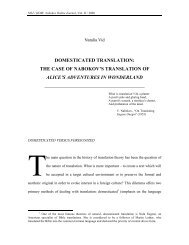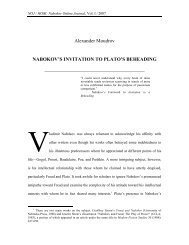Create successful ePaper yourself
Turn your PDF publications into a flip-book with our unique Google optimized e-Paper software.
destructs and prevents the relationship from growing into a mutually affectionate one. Lolita’s<br />
response of treacherously deceiving him and ultimately running away with someone who had<br />
avoided positioning himself as a father figure is therefore logical and perfectly understandable<br />
from both moral and emotional standpoints. H.H.’s prohibiting her to mix with other adolescents<br />
was the last drop into the cup of her patience.<br />
But it must be understood that H.H. is “in the grip of an obsessional lust” and, as a man in<br />
“passion-love,” he is a “sick man, a patient” (Trilling 2000, 366, 368). Trilling makes a<br />
wonderful point when he argues that the modern idea of love is very remote from passion-love; it<br />
is thus inadequate to judge Humbert’s behavior in terms of “sexual health”; and he was definitely<br />
not aspiring to create a “healthy family” with Lolita. But his predicament is not only about his<br />
own sexual hypocrisy; as noted above, it is also about the “sexual hypocrisy of American life”<br />
(Trilling 2000, 364). H.H. was never able to figure out how to act with Lolita partly due to the<br />
fact that she was certainly a precocious, oversexed “girl-child,” whose sexuality was<br />
simultaneously restrained and stimulated by the hypocritical society.<br />
Sarah Herbold is therefore absolutely right when she encourages her students to<br />
“articulate the paradox of Lolita’s duplicity and confront head-on its confusing implications.”<br />
She argues that “while Lolita can be seen as a victim, she must also be seen as a powerful agent,<br />
in whom erotic desire and creativity are as closely intertwined as they are for Humbert (and<br />
Nabokov)” (Kuzmanovich 2008, 138).<br />
Dmitri Nabokov echoes Herbold as he compares Lolita with her main forerunner – the<br />
heroine of The Enchanter, who is much less developed as an autonomous agent:<br />
Dolores Haze may, as Nabokov says, be “very much the same lass” as the Enchanter’s<br />
victim, but only in an inspirational, conceptional sense. In other ways the earlier child is<br />
very different – perverse only in the madman’s eyes; innocently incapable of anything<br />
like the Quilty intrigue; sexually unawakened and physically immature (Nabokov 1986,<br />
127).<br />
Indeed, since Lem and Trilling’s programmatic essays, there has not been too much criticism that<br />
would focus on Lolita as an independent, powerful force playing a major role in the love triangle<br />
with Quilty and Humbert, having her own sexual desires and preferences, making her own<br />
choices. Herbold’s essay very helpfully points toward the necessity of such critical perspectives.<br />
26

















